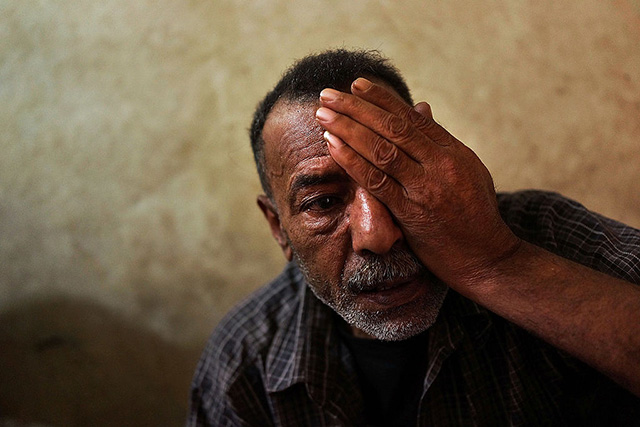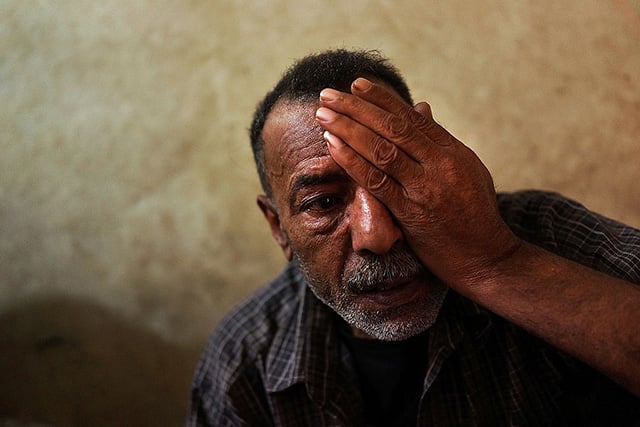
 Syrian refugee Mohammed Hmayed holds a hand over an eye that was injured by shrapnel in a bombing in Syria in which he also lost a finger on November 13, 2013, in Beirut, Lebanon. Hmayed, who is from the city of Douma, Syria, lives in a two-room apartment with 12 people. (Photo: Spencer Platt / Getty Images)
Syrian refugee Mohammed Hmayed holds a hand over an eye that was injured by shrapnel in a bombing in Syria in which he also lost a finger on November 13, 2013, in Beirut, Lebanon. Hmayed, who is from the city of Douma, Syria, lives in a two-room apartment with 12 people. (Photo: Spencer Platt / Getty Images)
In the following excerpt, two Syrian refugees interviewed by Wendy Pearlman share their experiences. (Interviews conducted in Arabic).
Um Khaled, Mother (Aleppo)
Our house was bombed and collapsed on top of us. We spent a year going from place to place inside Syria. We spent all the money we had. First we went to the countryside. We were thirty-five people in one house. The women would sleep in one room and the men in another. When there was shelling, we’d be about three hundred people in the underground shelter.
My youngest daughter, Hayat, was in first grade. She’d wake up at night screaming and her father would hold her. Finally he told me, “You can’t bear any more of this. It will destroy you. I want to get you to another country.”
I said, “Come with us.”
He said, “No, I want to get you to safety.” He wanted to stay because our eldest daughter was staying. She is married and has four kids.
So we left and came to Lebanon and my husband and daughter stayed in Syria. I’d talk to him and tell him to get out. He’d say, “You still have a daughter in Syria and I want to be able to check on her. Your siblings and my siblings and their children are also here. I won’t leave. The important thing is that I am reassured about you.” He’d ask me if I was well and I would say yes. But I was not well. I just wanted to put his heart at ease.
We found a storage space where we could live. I had some gold and I sold part of it to pay the rent. The space had no water, no electricity, nothing. But it was a place for us to sleep — me and my children, my grandchildren, and one of my sons-in-law, who was sick with liver disease. I’m a housewife and have no experience working. But I found work in a factory and worked for six months. I didn’t tell my husband.
Then I got news that a plane dropped a bomb and killed seven people. My husband was among them. I don’t know if he was inside the house or outside the house. The house was blown away. I tried to get information, to understand what happened. People told me that he was just like everyone else: you’re in the street and a missile comes, or who knows what. They sent me a photo of his burial so I’d believe that he was dead.
That was three years ago. When he died, I had to observe a period of mourning, as our religion expects. So I stopped working and stayed home. We had no food or drink. I got my other daughters here from Syria, God knows how. One was eight months pregnant. Her husband was not allowed through. She suffered. She’d faint when she stood up. I’d cry thinking that she was going to die.
I found another job, washing stairs in buildings and sweeping garages. By then we were eighteen people sleeping in the storage space: my four married daughters, my three sons-in-law, their nine children, Hayat, and me. In winter I’d put a thin comforter on the floor for the kids and fold it over them. After they woke up, I’d put it on myself.
Hayat would wake up in the middle of the night screaming, “Mama, they killed Daddy!” I’d say, “It’s okay, God rest his soul.”
The other kids would say, “Grandma, look at the mouse!” I’d say, “It’s okay, it won’t do anything.”
Nur, Beautician (Aleppo)
After two years in Lebanon, my husband’s work came to a halt. We went back to Aleppo, but found things were even worse then we’d left them. We needed to find somewhere else to go.
We left for Turkey and then made it to the shore. I’d carefully packed one bag with basic necessities: our papers, passports, water, aspirin, rubbing alcohol, toothpaste, a change of clothes, and cookies for the kids. The smuggler told us that there was no room, and we’d have to leave everything behind.
Truthout Progressive Pick

“A powerful must-read book for anyone wanting to understand what’s happening in Syria and why it matters.” — Chicago Review of Books
Click here now to get the book!
The dinghy arrived. Getting on was like throwing yourself into a deep, dark hole. My husband looked at me and said, “Should we go back?” I responded, “To where?”
In Greece we started walking. My husband carried our son the entire three-week journey. I held our daughter by the hand. We went from Greece to Macedonia, and then to Serbia, Hungary, and Austria before reaching Germany. Everyone along the way tried to make profits at our expense. Days were flaming hot and nights as cold as ice. My feet bled and all I wanted to do was sleep. Every step we took, we found ourselves longing for the one we’d just taken. When we slept on the street, we’d say, “How beautiful the dinghy was.” Then we’d get to a field where thousands of people were waiting for days to cross the border from one country to another. We’d say, “How beautiful it was to sleep in the street.”
Once while I was waiting for an appointment in one of the state agencies here I met a journalist. She told me, “The most important thing is that now you’re safe.” I told her, “But we haven’t come looking for safety. We’re not afraid of death.”
And it’s true. We don’t have a problem with death. Our problem is life without dignity. If we’d known what was in store for us, we never would have come. But we did come, and now we can’t just return. There’s no way back. It’s as if we were walking on a rope that kept getting cut behind us as we moved forward. Like in the cartoons, when the characters cross a bridge that crumbles beneath them as they run.
Copyright (2017) by Wendy Pearlman. Not to be reposted without permission of Harper Collins Publishers.
Join us in defending the truth before it’s too late
The future of independent journalism is uncertain, and the consequences of losing it are too grave to ignore. We have hours left to raise the $12,0000 still needed to ensure Truthout remains safe, strong, and free. Every dollar raised goes directly toward the costs of producing news you can trust.
Please give what you can — because by supporting us with a tax-deductible donation, you’re not just preserving a source of news, you’re helping to safeguard what’s left of our democracy.